- Home
- Kōji Suzuki
The Complete Ring Trilogy Page 7
The Complete Ring Trilogy Read online
Page 7
“I thought I’d maybe borrow a video after all.”
The manager grinned happily. “Go right ahead, whichever you’d like. They’re three hundred yen each.”
Asakawa scanned the titles for scary-looking movies. The Legend of Hell House, The Exorcist, The Omen. He had seen them all in his student days. Nothing else? There had to be some he hadn’t seen. He searched from one end of the shelves to the other, and saw nothing that looked likely. He started over, reading the titles of every one of the two hundred or so videos. And then, on the very bottom shelf, way over in the corner, he noticed a video without a case, fallen over on its side. All the other tapes were encased in jackets with photos and imposing logos, but this one lacked even a label.
“What’s that there?” After he’d asked the question, Asakawa realized that he’d used a pronoun, that, as he pointed to the tape. If it didn’t have a name, what else was he supposed to call it?
The manager gave a bothered frown and replied, none too brightly, “Huh?” Then he picked up the tape. “This? This isn’t anything.”
… Hey, I wonder if this guy even knows what’s on that tape.
“Have you seen it? That one,” asked Asakawa.
“Let me see.” The manager cocked his head repeatedly, as if he couldn’t figure out what something like this was doing here.
“If you don’t mind, could I borrow that tape?”
Instead of replying, the manager slapped his knee. “Ah, I remember now. It was kicking around in one of the rooms. I just figured it was one of ours and brought it here, but …”
“This wouldn’t have happened to be in B-4, I don’t suppose?” Asakawa asked slowly, pressing the point home. The manager laughed and shook his head.
“I haven’t the foggiest. It was a couple of months ago.”
Asakawa asked once more, “Have you … seen … this video?”
The manager just shook his head. The smile disappeared from his face. “No.”
“Well, let me rent it.”
“You going to record something on the TV?”
“Yeah, well, I, ah …”
The manager glanced at the video. “The tab is broken. See? You can’t record on it.”
Maybe it was the alcohol, but Asakawa was getting irritated. I’m telling you to rent it to me, you idiot, just hand it over, he griped to himself. But no matter how drunk he was, Asakawa was never able to come on very strong with other people.
“Please. I’ll bring it right back.”
He bowed. The manager couldn’t figure out why his guest was showing so much interest in this old thing. Maybe there was something interesting on it, something somebody had forgotten to erase … Now he wished he’d watched it when he found it. He felt the sudden temptation to watch it right now, but he couldn’t very well refuse a guest who had asked for it. The manager handed over the tape. Asakawa reached for his wallet, but the manager stopped him with his hand.
“That’s alright, you don’t need to pay. I can’t charge you for this, now, can I?”
“Thanks a lot. I’ll bring it right back.”
“If it turns out to be interesting, then please do!” The manager’s curiosity had been piqued. He’d already seen every video here at least once, and most of them had ceased to interest him. How did I miss that one anyway? It would have killed a few hours. Aw, but it probably only has some stupid TV show recorded on it anyway.
The manager was sure the video would come back right away.
2
The tape had been rewound. It was an ordinary 120-minute tape, the sort you could get anywhere, and, as the manager had pointed out, the anti-erasure tabs had been broken off. Asakawa turned on the VCR and pushed the tape into the slot. He sat down cross-legged right in front of the screen and pressed play. He heard the capstans start to turn. He had high hopes that the key to unlock the riddle of four people’s deaths was hidden on this tape. He’d pushed play fully intending to be satisfied with just a clue, any clue. There can’t be any danger, he was thinking. What harm could come from just watching a videotape?
Random sounds and distorted images flickered on the screen, but once he had selected the right channel, the picture steadied. Then the screen went black as ink. This was the video’s first scene. There was no sound. Wondering if it had broken, he brought his face close to the screen. Consider yourself warned: you’d better not see it. You’ll be sorry you did. Shuichi Iwata’s words came back to him. Why should he be sorry? Asakawa was used to things like this. He’d covered the local news. No matter what sort of horrific images he might be shown, he felt confident he wouldn’t regret watching.
In the middle of the black screen he thought he saw a pinpoint of light begin to flicker. It gradually expanded, jumping around to the left and right, before finally coming to rest on the left-hand side. Then it branched out, becoming a frayed bundle of lights, crawling around like worms, which finally formed themselves into words. Not the kind of captions one normally saw on film, though. These were poorly-written, as if scrawled by a white brush on jet-black paper. Somehow, though, he managed to make out what they said: WATCH UNTIL THE END. A command. These words disappeared, and the next floated up into view. YOU WILL BE EATEN BY THE LOST … The last word didn’t make much sense, but being eaten didn’t sound too pleasant. It seemed that there must have been an “or else” implied there. Don’t turn off the video halfway through, or else something awful will happen: it was a threat.
YOU WILL BE EATEN BY THE LOST … The words grew larger and chased all the black from the screen. It was a flat change, from black to milk-white. It was a patchy, unnatural color, and it began to resemble a series of concepts painted on a canvas, one over another. The unconscious, squirming, worrying, finding an exit, spurting out—or maybe it was the throb of life. Thought had energy, bestially satiating itself on darkness. Strangely, he felt no desire to push stop. Not because he was unafraid of whatever wanted to eat him, but because this intense outpouring of energy felt good.
Something red burst onto the monochrome screen. At the same time he heard the ground rumble, from an indefinable direction. The sound seemed to come from everywhere, such that he began to imagine that the whole cabin was shaking. It didn’t feel like the sound was coming from those little speakers. The sluggish red fluid exploded and flew about, sometimes occupying the whole screen. From black to white, and now red … It was nothing but a violent succession of colors, he hadn’t seen any natural scenery yet. Just concepts in the abstract, etched vividly into his brain by the brilliantly shifting colors. It was tiring, actually. And then, as if it had read the viewer’s mind, the red retreated from the screen, and a mountain vista stretched out. At one glance he could tell it was a volcano, with a gentle peak. The volcano was sending up white puffs of smoke against a clear blue sky. The camera seemed to be situated somewhere at the foot of the mountain, where the ground was covered with rugged blackish-brown lava.
Again the screen was swathed in darkness. The clear blue sky was instantaneously painted black, and then, a few seconds later, a scarlet liquid spurted out from the center of the screen, flowing downward. A second explosion. The spray thrown up by it burned red, and as a result he could begin to make out, faintly, the outline of the mountain. The images were now concrete where they had previously been abstract. This was clearly a volcanic eruption, a natural phenomenon, a scene that could be explained. The molten lava flowing from the mouth of the volcano threaded its way down through ravines and headed this way. Where was the camera positioned? Unless it was an aerial shot, it looked like the camera was about to be swallowed up. The rumblings of the earth increased until the whole screen seemed about to be engulfed in molten rock, and then the scene abruptly changed. There was no continuity from one scene to the next, only sudden shifts.
Thick, black letters floated into view against a white background. Their edges were blurred, but he somehow managed to make out the character for “mountain”. It was surrounded by black splatters, as if it had bee
n written sloppily by a brush dripping with ink. The character was motionless, the screen was calm.
Another sudden shift. A pair of dice, tumbling around in the rounded bottom of a lead bowl. The background was white, the bottom of the bowl was black, and the one on the dice was red. The same three colors he’d seen so often already. The dice rolled around soundlessly, finally coming to rest: a one and a five. The single red dot and the five black ones arranged on the white faces of the dice … What did it mean?
In the next scene people appeared for the first time. An old woman, face lined with wrinkles, sat perched on a pair of tatami mats on a wooden floor. Her hands rested on her knees and her left shoulder was thrust slightly forward. She was speaking, slowly, looking straight ahead. Her eyes were different sizes—when she blinked, it looked like she was winking instead.
She was speaking in an unfamiliar dialect, and he could only catch every other word or so:
… your health … since … spend all your time … bound to get you. Understand? Be careful of … you’re going to … you listen to granny now because … there’s no need to …
The old expressionless woman made her statement, then vanished. There were a lot of words he didn’t understand. But he had the impression he’d just been lectured to. She was telling him to be careful of something, warning him. Who was this old lady talking to—and about?
The face of a newborn baby filled the screen. From somewhere he could hear a baby’s first cry. This time, too, he was sure it didn’t come from the television speakers. It came from very near, beneath his face. It was very like a real voice. On-screen, he could now see hands holding the baby. The left hand was under its head, and the right was behind its back, holding it carefully. They were beautiful hands. Totally absorbed by the image, Asakawa found himself holding his own hands in the same position. He heard the birth cry directly below his own chin. Startled, he pulled back his hands. He had felt something. Something warm and wet—like amniotic fluid, or blood—and the weight of flesh. Asakawa jerked his hands apart, as if casting something aside, and brought his palms close to his face. A smell lingered. The faint smell of blood—had it come from the womb, or … ? His hands felt wet. But in reality, they weren’t even damp. He restored his gaze to the screen. It still showed the baby’s face. In spite of the crying its face was swathed in a peaceful expression, and the shaking of its body had spread to its groin, even wiggling its little thing.
The next scene: a hundred human faces. Each one displayed hatred and animosity; he couldn’t see any distinguishing features other than that. The myriad faces, looking as if they had been painted on a flat surface, gradually receded into the depths of the screen. And as each face diminished in size, the total number increased, until they had swollen to a great multitude. It was a strange multitude, though—existing only from the neck up—but the sounds welling up from them befit a crowd. Their mouths were shouting something, even as they shrank and multiplied. He couldn’t quite make out what they were saying. It sounded like the commotion of a great gathering, but the voices were tinged with criticism, abuse. The voices were clearly not welcoming or cheering. Finally he made out a word: “Liar!” And another: “Fraud!” By now there were perhaps a thousand faces: they had become nothing but black particles, filling the screen until it looked like the television had been turned off, but the voices continued. It was more than Asakawa could bear. All that criticism, directed right at him. That’s how it felt.
When the next scene appeared, it showed a television on a wooden stand. It was an old-fashioned nineteen-inch set with a round channel selector, and a rabbit-ear antenna sat on its wooden cabinet. Not a play within a play, but a TV within a TV. The television within had nothing on its screen yet. But it seemed to be on: the red light by the channel knob was lit. Then the screen-within-the-screen wavered. It stabilized and then wavered again, over and over, with increasing frequency. Then a single character appeared, hazily: sada. The word faded in and out of focus, distorted, and began to look like another before disappearing altogether, like chalk on a blackboard wiped with a wet rag.
As he watched, Asakawa began to find it hard to breathe. He could hear his heart beat, feel the pressure of the blood flowing in his veins. A smell, a touch, a sour-sweet taste stabbing his tongue. Strange—something was stimulating his five senses, some medium besides the sounds and visions that appeared as if he were suddenly recalling them.
Then the face of a man appeared. Unlike the previous images, this man was definitely alive—he had a pulsating vitality. As he watched, Asakawa began to feel hatred toward him. He had no idea why he should hate this man. He wasn’t particularly ugly. His forehead sloped a bit, but other than that he was actually rather well-formed. But there was something dangerous in his eyes. They were the eyes of a beast closing in on its prey. The man’s face was sweaty. His breathing was ragged, his gaze was turned upward, and his body was moving rhythmically. Behind the man grew scattered trees, the afternoon sunlight shone between their branches. The man brought his eyes down and looked straight ahead again, and his gaze locked with the viewer’s. Asakawa and the man stared at each other for a while. The stifling sensation grew, and he suddenly wanted to tear his gaze away. The man was drooling; his eyes were bloodshot. His neck muscles began to fill the screen in a closeup, then disappeared off the left side of the screen. For a while only the black shade of the trees could be seen. A scream began to well up from deep down inside. At the same time, the man’s shoulder came back into view, then his neck, and finally his face again. His shoulders were bare, and the right one carried a deep, bloody gash several centimeters long. Drops of blood seemed to be sucked toward the camera, growing larger and larger until they hit the lens and clouded over the view. The screen cut to black once, twice, almost like blinking, and when the light returned everything was red. There was a murderous look in the man’s eyes. His face drew closer, along with his shoulder, the bone peeking out white where the flesh had been gouged out. Asakawa felt a violent pressure on his chest. He saw trees again. The sky was spinning. The color of the sky fading into sunset, the rustling of dry grass. He saw dirt, then weeds, and then sky again. Somewhere he heard a baby crying. He wasn’t sure if it was the little infant from before. Finally, the edge of the screen turned black, darkness gradually encroaching in a ring on the center. Dark and light were clearly defined now. At the center of the screen, a small round moon of light floated in the middle of the darkness. There was a man’s face in the moon. A fist-sized clump of something fell from the moon, making a dull thud. Another, and then another. With each sound, the image jumped and swayed. The sound of flesh being smashed, and then true darkness. Even then, a pulse remained. Blood still circulated, throbbing. The scene went on and on. A darkness that seemed as if it would never end. Then, just as at the beginning, words faded into view. The writing in the first scene had been crude, like that of a child just learning to write, but this was somewhat better. White letters, drifting into view and then fading, read:
Those who have viewed these images are fated to die at this exact hour one week from now. If you do not wish to die, you must follow these instructions exactly …
Asakawa gulped and stared wide-eyed at the television. But then the scene changed yet again. A complete and utter change. A commercial came on, a perfectly ordinary, common television commercial. A romantic old neighborhood on a summer’s evening, an actress in a light cotton robe sitting on her verandah, fireworks lighting up the night sky. A commercial for mosquito-repelling coils. After about thirty seconds the commercial ended, and just as another scene was about to start, the screen returned to its previous state. Darkness, with the last afterglow of faded words. Then the sound of static as the tape ended.
Bug-eyed, Asakawa rewound the tape and replayed the last scene. The same sequence repeated itself: a commercial interrupted at the most important point. Asakawa stopped the video and turned off the television. But he kept staring at the screen. His throat was parched.
&n
bsp; “What the hell?”
There was nothing else to say. One unintelligible scene after another, and the only thing he’d comprehended was that anybody who watched would die in exactly a week. And the part which told how to avoid this fate had been taped over with a commercial.
… Who erased it? Those four?
Asakawa’s jaw quivered. If he didn’t know that the four young people had died simultaneously, he could have laughed this off as sheer nonsense. But he knew. They had died, mysteriously, as predicted.
At that moment the phone rang. Asakawa’s heart nearly jumped out of his chest at the sound. He picked up the receiver. He felt as though something were concealing itself, watching him from the darkness.
“Hello,” he finally managed to croak. There was no reply. Something was swirling around in a dark, cramped place. There was a deep rumble, as if the earth were resounding, and the damp smell of soil. There was a chill at his ear, and the hairs on the nape of his neck stood up. The pressure on his chest increased, and bugs from the bowels of the earth were crawling on his ankles and his spine, clinging to him. Unspeakable thoughts and long-ripened hatred almost reached him through the receiver. Asakawa slammed down the receiver. Covering his mouth, he ran to the bathroom. Chills ran up and down his backbone, waves of nausea swept over him: the thing on the other end of the line hadn’t said anything, but Asakawa knew what it wanted. It was a confirmation call.
You’ve seen it now, you know what that means. Do like it said. Or else …
Asakawa vomited over the toilet. He didn’t have much to throw up. The whiskey he’d drunk earlier flowed out of him now, mixed with bile. The bitterness seeped into his eyes, squeezing out tears; it hurt his nose. But he felt that if he threw up everything now, here, maybe the images he’d just watched would go flowing out of him, too.

 Death and the Flower
Death and the Flower Spiral
Spiral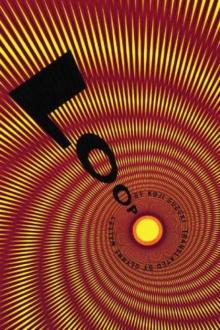 Loop
Loop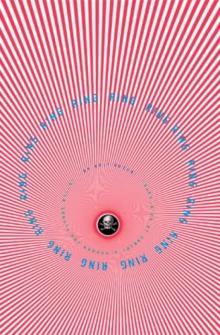 Ring
Ring S
S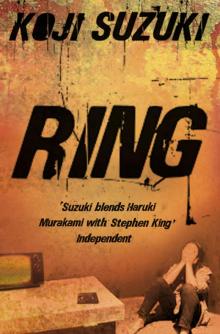 The Complete Ring Trilogy: Ring, Spiral, Loop
The Complete Ring Trilogy: Ring, Spiral, Loop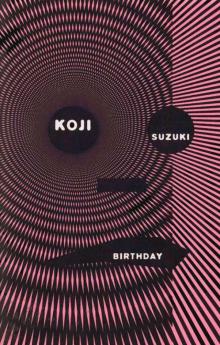 Birthday
Birthday Edge
Edge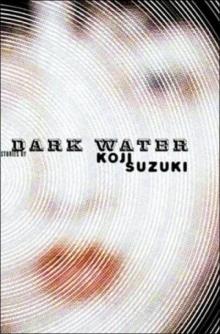 Dark Water
Dark Water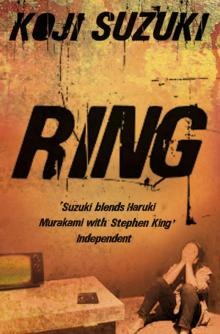 The Complete Ring Trilogy
The Complete Ring Trilogy